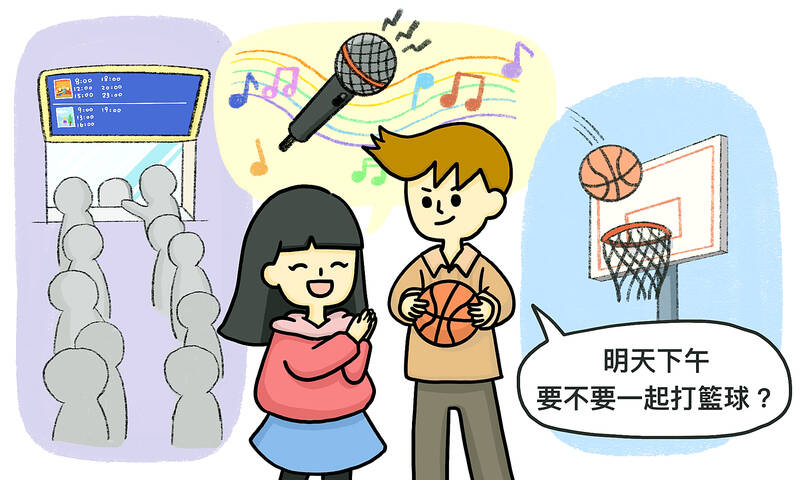對話 Dialogue
馬克:小實,明天下午要不要一起打籃球?
Make: Xiǎoshí, míngtiān xiàwǔ yào búyào yìqǐ dǎ lánqiú?

小實:明天下午我有空,可是我不會打籃球。
Xiaoshi: Míngtiān xiàwǔ wǒ yǒu kòng, kěshì wǒ búhuì dǎ lánqiú.
馬克:那你想做什麼?
Make: Nà nǐ xiǎng zuò shénme?
小實:我想看電影!我喜歡看電影,你呢?
Xiaoshi: Wǒ xiǎng kàn diànyǐng! Wǒ xǐhuān kàn diànyǐng, nǐ ne?
馬克:我也喜歡看電影,可是明天是星期六,電影院的人很多。
Make: Wǒ yě xǐhuān kàn diànyǐng, kěshì míngtiān shì xīngqíliù, diànyǐngyuàn de rén hěnduō.
小實:那你喜歡唱歌嗎?
Xiaoshi: Nà nǐ xǐhuān chànggē ma?
馬克:喜歡,打籃球、看電影和唱歌,我都喜歡。
Make: Xǐhuān, dǎ lánqiú, kàn diànyǐng hàn chànggē, wǒ dōu xǐhuān.
小實:那麼我們明天下午一起唱歌吧!
Xiaoshi: Nàme wǒmen míngtiān xiàwǔ yìqǐ chànggē ba!
翻譯 Translation
Mark: Xiaoshi, do you want to play basketball together tomorrow afternoon?
Xiaoshi: I’m free tomorrow afternoon, but I don’t know how to play basketball.
Mark: So, what would you like to do?
Xiaoshi: I want to see a movie! I like watching movies. How about you?
Mark: I do like to watch movies, but it will be crowded in the movie theater tomorrow, Saturday.
Xiaoshi: Then, do you like singing?
Mark: I like playing basketball, watching movies and singing. I like all of them.
Xiaoshi: Then let’s sing together tomorrow afternoon!
單字片語 Vocabulary
1. 籃球 (lánqiú) basketball
2. 有空 (yǒu kòng) available
3. 那(麼) (nà [me]) then, well, so
4. 可是 (kěshì) but
5 .星期六 (xīngqí liù) Saturday
6. 電影院 (diànyǐngyuàn)) cinema, theater
7. 唱歌 (chànggē) to sing
教材音檔 Audio Files
實踐大學華語中心提供
By Shih Chien University Chinese Language Center: https://chineseusc.com/

A: As the Taiwan Pride parade enters its 23rd year, the nation also celebrates the sixth anniversary of the legalization of same-sex marriage. B: However, a poll showed that support for same-sex marriage slightly dropped to 54.3 percent from last year’s 56.5 percent. A: The government is wavering on whether to extend the Assisted Reproduction Act to same-sex couples, leading to public doubts. B: Since US President Donald Trump took office in January, his oppression of Diversity, Equity and Inclusion (DEI) programs has also frustrated the global LGBT community. A: Let’s join the parade in Taipei tomorrow to

The stress of a long workday was really weighing Sarah down, and she felt the urgent need to get away. The moment the thought of escape crossed her mind, her fingers flew to the keyboard and typed “travel destinations.” Later, while she was casually scrolling through her social media, she was met with a flood of travel ads. There were lots of options, such as a serene hideaway in Kyoto and a luxurious beach villa in Bali, each perfectly echoing her desire. This is the magic of the recommender system at work. Recommender systems offer personalized suggestions by tracking your digital

Pigs that are resistant to a deadly viral disease have been created by scientists at Edinburgh’s Roslin Institute. The gene-edited animals remained healthy when exposed to classical swine fever (CSF), a highly contagious and often fatal disease. The virus was eradicated in the UK in 1966, but there have been several outbreaks since and it continues to pose a major threat to pig farming worldwide. “Classical swine fever is a devastating disease for livestock and farmers as we saw with the outbreak in the UK, 25 years ago,” said Helen Crooke, mammalian virology deputy leader at the Animal and Plant Health Agency

對話 Dialogue 清清:明天我想請一天假。 Qīngqing: Míngtiān wǒ xiǎng qǐng yì tiān jià. 華華:為什麼?這個月的假已經很多了,你還要請假啊? Huáhua: Wèishénme? Zhège yuè de jià yǐjīng hěn duō le, nǐ háiyào qǐngjià a? 清清:因為明天是農曆九月初九重陽節,重陽節是老人節,我想陪我阿公阿嬤去爬山,而且家裡也要拜祖先,請假比較方便。 Qīngqing: Yīnwèi míngtiān shì nónglì jiǔ yuè chū jiǔ Chóngyáng Jié, Chóngyáng Jié shì Lǎorén Jié, wǒ xiǎng péi wǒ āgōng āma qù páshān, érqiě jiālǐ yě yào bài zǔxiān, qǐng jià bǐjiào fāngbiàn. 華華:了解,是應該陪老人出去走走。阿公阿嬤應該會拿到政府發的紅包吧? Huáhua: Liǎojiě, shì yīnggāi péi lǎorén chūqù zǒuzǒu. Āgōng āma yīnggāi huì nádào zhèngfǔ fā de hóngbāo ba? 清清:有啊!65歲以上的長輩都會領到敬老金,只是每個縣市給的數字不太一樣,年紀越大,拿到的會越多喔! Qīngqing: Yǒu a! Liùshíwǔ suì yǐshàng de zhǎngbèi dōu huì lǐngdào jìnglǎojīn, zhǐshì měi gè xiànshì gěi de shùzì bútài yíyàng, érqiě niánjì yuè dà, ná dào de huì